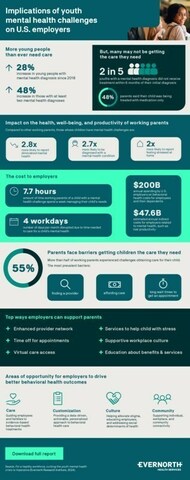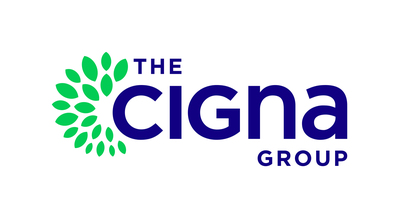New Report: Employers Play Critical Role in Curbing Today's Youth Mental Health Crisis
- None.
- None.
- Declining youth mental health persists, and many young people receive fragmented care
- Managing a child's mental health needs significantly impacts working parents, both personally and professionally
- Opportunity for employers to strengthen approach to family mental health, drive improved health outcomes
- The Cigna Group announced new, multiyear philanthropic and community engagement program to improve youth mental health
"The youth mental health crisis continues to grow, and it is taking a significant toll on kids, parents, families and their communities," said David M. Cordani, chairman and CEO, The Cigna Group. "To foster a vital, thriving society, we must change the trajectory of the mental health crisis and address the human and economic toll at its very core. In collaboration with employers, we have the unique ability to curb the crisis by more effectively engaging parents and children quickly and seamlessly and fostering workplaces that are supportive of family mental health."
Many young people are not receiving the full spectrum of behavioral health care
The number of young people with mental health conditions has increased
More young people than ever are receiving treatment for mental health issues. However, treatment patterns show many young people are receiving partial treatment, fragmented treatment, and some are not obtaining treatment at all. One in five youths did not receive any type of treatment within three months of an initial behavioral health diagnosis, which can result in additional challenges, such as increased severity of mental health conditions, impacts to physical health, and behavioral issues at home and school.
Just under a third (
Working parents struggling to tend to their child's mental health needs and their own
More than half of working parents (
"Behind every young person, every prescription, and every appointment is often a parent trying to help their child feel better," said Eva Borden, president of behavioral health, Evernorth Health Services. "The significant emotional burden parents and caregivers carry manifests into stress and anxiety that impacts life at home, at work, and in the community. This research is a call to action for employers to strengthen their approach to parental support and behavioral health care to drive measurable, improved health outcomes – with the goal of changing the trajectory of the crisis."
Employers can do more to make it easier for parents to care for family mental health needs and help optimize their workforces
Parents of children with mental health challenges said the top ways employers can help are by providing access to enhanced behavioral provider networks, time off for appointments, and options for virtual behavioral care. On average, working parents of a child with mental health challenges spend 7.7 hours per week managing their child's needs. They also report up to four workdays per month are disrupted by starting late, leaving early, or missing days to tend to activities related to their child's mental health.
According to the Evernorth analysis, four areas of opportunity for employers to drive better behavioral health outcomes for young people and parents are care delivery, customization, culture, and community engagement.
The report "For a Healthy Workforce, Curbing The Youth Mental Health Crisis Is Imperative" is based on an analysis from the Evernorth Research Institute, which examined trends in youth mental health conditions based on claims data for more than 20 million commercially insured people under age 26. Evernorth also surveyed more than 1,500
This research builds on previous research commissioned by The Cigna Group tracking the scope and scale of the youth mental health crisis. The Cigna Group has increased the number of behavioral health specialists within its Cigna Healthcare and Evernorth Health Services businesses who specialize in treating younger people by
The Cigna Group Foundation Announces Commitment to Post-Pandemic Acute Stress
The company also recently announced a new, multiyear philanthropic and community engagement program to improve youth mental health with a key focus on post-pandemic acute stress and distress. The program will support a range of community organizations through foundation grants, corporate giving, employee matching, and volunteerism.
The Cigna Group Foundation will prioritize grants in regions where The Cigna Group serves a significant number of customers with high and very high social determinant of health risks, including
About The Cigna Group
The Cigna Group (NYSE:CI) is a global health company committed to creating a better future built on the vitality of every individual and every community. We relentlessly challenge ourselves to partner and innovate solutions for better health. The Cigna Group includes products and services marketed under Cigna Healthcare, Evernorth Health Services or its subsidiaries. The Cigna Group maintains sales capabilities in more than 30 countries and jurisdictions, and has more than 183 million customer relationships around the world. Learn more at thecignagroup.com.
Media Contact
Kelly Mathews
(423) 260-9267
Kelly.mathews@evernorth.com
![]() View original content to download multimedia:https://www.prnewswire.com/news-releases/new-report-employers-play-critical-role-in-curbing-todays-youth-mental-health-crisis-302128203.html
View original content to download multimedia:https://www.prnewswire.com/news-releases/new-report-employers-play-critical-role-in-curbing-todays-youth-mental-health-crisis-302128203.html
SOURCE The Cigna Group









